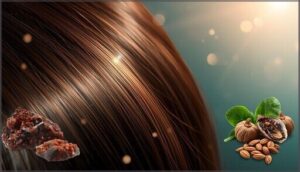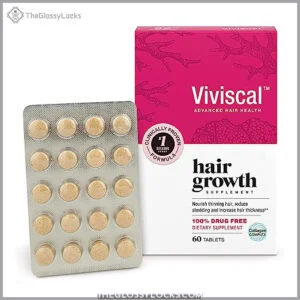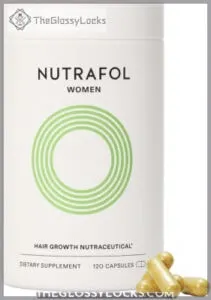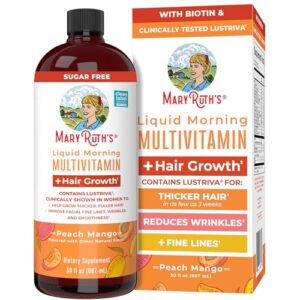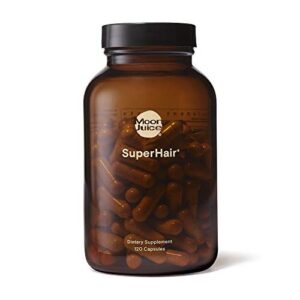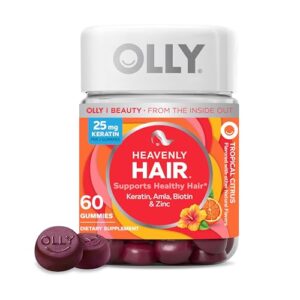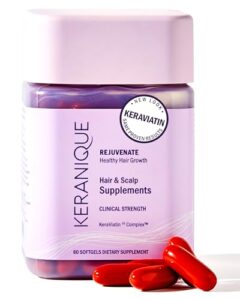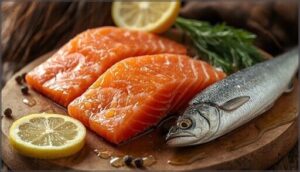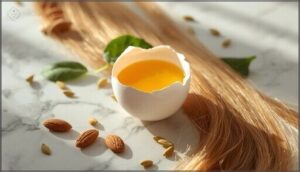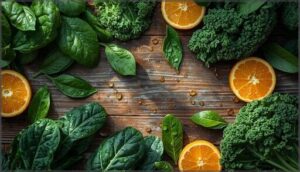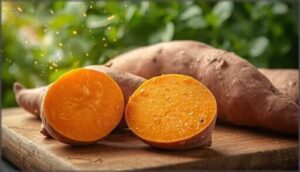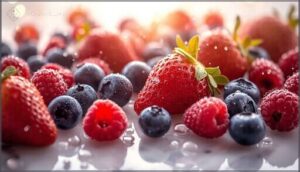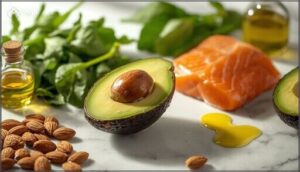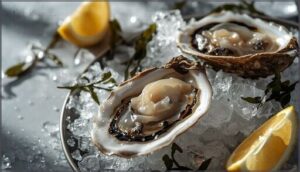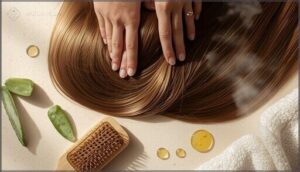This site is supported by our readers. We may earn a commission, at no cost to you, if you purchase through links.
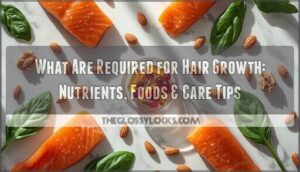
Your hair sheds roughly 50 to 100 strands every single day—and those follicles need a steady stream of nutrients to rebuild what’s lost. Without the right vitamins, minerals, and proteins, growth stalls, breakage accelerates, and thinning becomes visible.
The good news? Hair follicles respond quickly when you give them what they need. From biotin and iron to omega-3s and zinc, specific nutrients keep follicles cycling, strands strong, and your scalp primed for growth. Once you understand what are required for hair growth, you can target deficiencies, fine-tune your diet, and adopt care practices that protect every strand from root to tip.
Table Of Contents
- Key Takeaways
- Essential Vitamins for Hair Growth
- Critical Minerals Your Hair Needs
- Protein and Fatty Acids for Hair
- Top 6 Hair Growth Supplements
- Best Foods for Hair Growth
- Scalp Health and Hair Care Practices
- When to See a Dermatologist
- Frequently Asked Questions (FAQs)
- What is the main thing needed for hair growth?
- What is needed to make your hair grow?
- What is the main ingredient needed for hair growth?
- What foods help hair growth?
- How can a healthy diet help hair growth?
- How do you get hair growth?
- How do you keep hair healthy?
- What products do you need for hair growth?
- What really helps your hair to grow?
- What vitamin is needed for hair growth?
- Conclusion
Key Takeaways
- Your hair follicles need a steady supply of biotin, iron, vitamin D, zinc, omega-3 fatty acids, and protein to rebuild the 50-100 strands you shed daily—without them, growth stalls and thinning becomes visible.
- Correcting a single nutrient deficiency like iron or biotin can reverse hair loss in just three to six months, showing how responsive your follicles are when you finally give them what they need.
- Clinical-grade supplements like Viviscal and Nutrafol target multiple root causes including stress hormones, inflammation, and DHT production, but most require consistent use for three to six months before you’ll see visible results.
- Whole foods like fatty fish, eggs, dark leafy greens, and berries deliver the vitamins, minerals, and antioxidants your scalp needs—paired with gentle care practices like scalp massage and proper detangling, they create the environment where strong hair actually thrives.
Essential Vitamins for Hair Growth
Your hair depends on a steady supply of specific vitamins to grow strong and stay healthy. Without the right ones, you might notice thinning, breakage, or slower growth—no matter how many products you layer on.
Women over 40 are especially vulnerable to deficiencies in iron, zinc, vitamin D, and biotin—nutrients that directly affect how well your hair grows and how much you retain, which is why targeted hair growth strategies for women over 40 focus heavily on addressing these gaps.
Here’s what your follicles actually need to thrive.
Biotin for Stronger Hair
Biotin benefits your hair by promoting keratin infrastructure and maintaining shaft integrity for smoother, less brittle strands. If you’re experiencing persistent thinning or brittle hair, biotin deficiency might be the culprit.
Most people need just 30 to 100 micrograms daily from eggs, nuts, or biotin supplements. Hair thickness improves gradually over months with consistent intake, especially when a deficiency exists.
It’s also important to recognize that biotin’s role in keratin production enhances overall hair, skin, and nail health.
Vitamin D’s Role in Follicle Health
Your follicles rely on vitamin D benefits to activate critical receptors that keep cycling smooth and shedding in check. When vitamin D deficiency creeps in, you’ll often see hair growth patterns falter—telogen effluvium and androgenetic alopecia become more common.
To support scalp health and follicle cycling, aim for adequate vitamin D through:
- Safe sun exposure for natural synthesis
- Fatty fish like salmon and mackerel
- Fortified dairy or vitamin supplements for hair when dietary sources fall short
Current research highlights a link between vitamin D levels and hair loss, emphasizing the importance of maintaining sufficient vitamin D.
Vitamin a for Scalp Protection
You need steady vitamin A benefits to keep your scalp balanced—not too oily, not too dry. Retinoid therapy promotes skin cell renewal, clearing away dead cells that clog follicles and hinder follicle health.
Think of it as routine maintenance for scalp protection. Pair nutrition for healthy hair with gentle vitamin supplements for hair, and you’ll nurture the environment your strands need to thrive alongside vitamin C and vitamin E.
Vitamin C for Collagen Production
Your scalp depends on vitamin C benefits to build the collagen that anchors every strand. Collagen synthesis requires this nutrient as a cofactor—without it, fibers weaken and break.
Antioxidant effects shield follicles from stress, while collagen production aids skin firming around roots. Citrus, peppers, and berries deliver the antioxidants you need for nutrition for healthy hair and sustained hair growth.
Vitamin E’s Antioxidant Benefits
Free radical protection starts with vitamin E’s power to neutralize oxidative damage at the cellular level. This fat-soluble antioxidant shields follicle membranes from environmental stress while supporting nutrition for hair health through:
- Donating hydrogen atoms to stop lipid peroxidation
- Working with vitamin C to recycle antioxidants
- Maintaining scalp cell integrity against UV exposure
- Reducing age-related tissue damage
Antioxidant-rich foods like nuts and seeds deliver these vitamin E benefits naturally.
Critical Minerals Your Hair Needs
Vitamins get most of the spotlight regarding hair health, but minerals are just as critical for strong, healthy growth.
Your follicles rely on specific minerals to function properly, deliver nutrients, and complete the hair growth cycle. Here are the four essential minerals your hair can’t do without.
Iron for Oxygen Delivery
Your hair follicles can’t thrive without adequate oxygen supply—and that’s where iron steps in. Iron drives oxygen transport by fueling hemoglobin production in red blood cells, delivering essential oxygen straight to your scalp.
Iron deficiency slashes this supply, triggering shedding and sluggish growth. Boost iron absorption by pairing iron-rich foods with vitamin C in a nutrient-rich diet for stronger strands.
Zinc for Growth Cycle Support
Strong hair growth depends on zinc’s power to regulate your follicle’s natural cycle. Zinc deficiency disrupts keratinocyte proliferation during the anagen phase, shortening growth windows and triggering shedding.
This essential mineral rebuilds hair shaft proteins and maintains mineral balance alongside iron and copper. Load up on oysters, beef, and fortified cereals—or consider a daily supplement under medical guidance—to keep follicles cycling smoothly and prevent nutrient deficiency and hair loss.
Selenium’s Protective Properties
Think of selenium as your follicle’s shield against oxidative stress—this trace mineral activates antioxidant defense enzymes that neutralize free radicals threatening your hair follicle cells.
Selenium acts as your follicle’s shield, activating antioxidant enzymes that neutralize free radicals threatening hair cells
Selenium benefits extend to thyroid support, enabling hormone conversion that governs growth cycles, while its role in nutrition and hair health protects keratin networks from damage. Mineral deficiency weakens antioxidants, so prioritize seafood and Brazil nuts to fuel hair growth promotion.
Magnesium for Follicle Function
Your follicle cells demand constant fuel—magnesium powers ATP synthesis for Energy Production, keeping growth phases humming. This mineral relaxes scalp vessels to boost Blood Flow, promotes Antioxidant Defense against oxidative damage, and drives Keratin Synthesis for stronger strands.
It even fine-tunes Hormone Balance in conditions like PCOS. Among essential Minerals for Hair Health, magnesium stands out; Nutrient Deficiency and Hair thinning often link to low intake, making it a cornerstone of Hair Growth Vitamins and Minerals that support Nutrition and Hair Health across Hair Follicles.
Protein and Fatty Acids for Hair
Your hair is made of protein, so it makes sense that what you eat plays a direct role in how strong and healthy it grows.
Beyond certain fats, work behind the scenes to keep your follicles nourished and your scalp in good shape. Let’s break down how these nutrients support your hair from the inside out.
Protein’s Role in Keratin Production
Your hair’s foundation begins with protein intake. Keratin structure—the fibrous protein that forms each strand—depends entirely on adequate protein intake (about 0.8 grams per kilogram of body weight daily), the keratinization process falters.
Without enough dietary protein, hair follicles can’t produce strong keratin, and you’ll notice brittle, thinning hair. Amino acids from protein-rich foods like eggs support collagen and keratin synthesis, giving you resilient, healthy strands.
Omega-3 Fatty Acids for Follicle Health
Just as your body can’t build keratin without protein, your follicles need omega-3 fatty acids to calm scalp inflammation and support healthy hair growth. EPA and DHA from fatty fish like salmon help maintain follicle cell membranes, improve nutrient delivery, and reduce shedding by keeping follicles in the growth phase longer.
Key omega-3 fatty acid benefits for your hair:
- Reduce chronic inflammation around follicles for healthier growth cycles
- Support scalp blood flow, delivering minerals and vitamins to follicle units
- Improve hair strand thickness and reduce excessive shedding
- Maintain scalp hydration, keeping follicles pliable and resilient
- Fish oil supplements or algae oil provide 250-1000mg EPA/DHA daily
Omega-6 for Scalp Nourishment
While omega-3s target inflammation, omega-6 fatty acids strengthen your scalp barrier and lock in moisture. This fatty acid found in nuts and seeds promotes hair elasticity, reducing breakage when you detangle.
For scalp health and wellness, balance matters—pair omega-6 from sunflower or sesame oil with omega-3s for ideal nutrient delivery and a hydrated, resilient scalp that fosters strong growth.
Top 6 Hair Growth Supplements
When diet alone isn’t cutting it, supplements can fill the gaps your follicles need to thrive.
The market’s flooded with options, so knowing which formulas actually deliver makes all the difference. Here are six clinically-backed supplements that consistently show results when taken as directed for three to six months.
1. Viviscal Hair Growth Supplement
You’ve probably scrolled past dozens of hair supplements promising miracles. Viviscal stands apart with actual clinical backing—a marine complex formula that’s been refined over two decades.
Take two tablets daily, and you’re feeding your follicles biotin, vitamin C, zinc, and the proprietary AminoMar blend derived from marine proteins. Results usually show up around the three-month mark: less shedding, fuller coverage, thicker strands.
It’s drug-free, works for color-treated hair, and targets existing growth rather than creating follicles from scratch.
| Best For | Women dealing with thinning hair from stress, hormonal changes, postpartum shedding, or aging who want a clinically backed supplement that nourishes hair from within. |
|---|---|
| Form | Tablet |
| Primary Ingredient | Marine Collagen |
| Supply Duration | 1 month |
| Hair Type | All types |
| Results Timeline | 3 months |
| Price Range | Moderate |
| Additional Features |
|
- Clinically proven formula with marine collagen, biotin, zinc, and vitamin C that actually delivers results
- Safe for all hair types including color-treated, fine, or thinning hair without harsh chemicals
- Shows visible improvements in thickness and reduced shedding in as little as 3 months
- Takes up to 3 months to see results, so you need patience and consistency
- Higher price point compared to basic biotin supplements
- Results vary by person and it won’t work for everyone’s hair loss situation
2. Nutrafol Hair Growth Supplement
Nutrafol takes a different route—four capsules daily loaded with 21 botanicals, vitamins, and minerals targeting stress, hormones, and inflammation. You’re getting ashwagandha to dial down cortisol, saw palmetto to block DHT (a key thinning trigger), and marine collagen peptides for hair shaft strength.
Expect to wait three to six months for visible changes. It’s pricey at $88 monthly, and a 2024 case report flagged potential liver concerns, so discuss it with your doctor before starting—especially if you’re postpartum or taking other supplements.
| Best For | Women dealing with stress-related thinning or hormonal hair loss who are willing to commit to a long timeline and higher price point. |
|---|---|
| Form | Capsule |
| Primary Ingredient | Marine Collagen |
| Supply Duration | 1 month |
| Hair Type | All types |
| Results Timeline | 3-6 months |
| Price Range | Premium ($88) |
| Additional Features |
|
- Targets multiple root causes like stress and inflammation with clinically-backed ingredients like ashwagandha and saw palmetto
- Dermatologist-recommended brand with a comprehensive formula of 21 botanicals, vitamins, and minerals
- Works for all hair types and addresses underlying issues beyond just surface-level symptoms
- Expensive at $88 per month with results taking 3-6 months to show
- Requires taking four capsules daily, which can be a lot to remember
- Potential liver concerns reported in 2024, so you’ll need to check with your doctor first—especially if you’re postpartum or on other supplements
3. Maryruth Liquid Multivitamin Hair Growth Supplement
Liquid delivery sets MaryRuth’s apart—10,000 mcg biotin in magnesium biotinate form absorbs faster than pills, plus the proprietary Lustriva ingredient clinically shown to thicken hair in women.
You’ll also get vitamin D3 for follicle support, vitamin E for antioxidant protection, and a full B-complex blend. It’s vegan, gluten-free, and flavored (peach mango or dragon fruit), making it easier to stick with. At $74.95 for 30 servings, it’s a mid-range option requiring daily consistency for visible results within weeks to months.
| Best For | Women experiencing hair thinning or shedding who prefer a liquid supplement over pills and want clinically-backed ingredients for both hair and skin health. |
|---|---|
| Form | Liquid |
| Primary Ingredient | Biotin 10,000 mcg |
| Supply Duration | 1 month |
| Hair Type | All types |
| Results Timeline | Consistent use |
| Price Range | Premium ($74.95) |
| Additional Features |
|
- Contains Lustriva, a clinically tested ingredient that actually shows results for hair growth and wrinkle reduction
- Liquid form with high-dose biotin (10,000 mcg) absorbs faster than traditional capsules
- Clean formula that’s vegan, gluten-free, and allergen-friendly with decent flavor options
- Pricey at $74.95 for a month’s supply compared to standard multivitamins
- Requires consistent daily use for weeks or months before you’ll see noticeable changes
- Won’t help with permanent balding or restore dead hair follicles
4. Moon Juice Hair Growth Vitamins
Moon Juice SuperHair takes a whole-body approach—four capsules daily deliver bioavailable vitamins A through K, plus organic ashwagandha to balance stress hormones that trigger shedding.
You’re also getting saw palmetto and pumpkin seed to help protect follicles from DHT, the hormone linked to thinning. Horsetail silica strengthens each shaft, while kelp provides iodine for thyroid balance.
At $46.20 for 30 servings, it’s vegan and designed for consistent use over weeks to months, addressing nutritional gaps that slow growth.
| Best For | People dealing with stress-related hair thinning or nutritional gaps who want a comprehensive supplement that addresses both hormones and follicle health. |
|---|---|
| Form | Capsule |
| Primary Ingredient | Biotin & Vitamins |
| Supply Duration | 1 month |
| Hair Type | All types |
| Results Timeline | 4 weeks-90 days |
| Price Range | Premium ($46.20) |
| Additional Features |
|
- Combines vitamins, adaptogens, and DHT blockers in one formula to tackle multiple causes of hair loss
- Includes ashwagandha to help manage cortisol levels that can trigger shedding
- Vegan-friendly with bioavailable nutrients designed for better absorption
- Pricey at $46.20 for a month’s supply, which adds up over time
- Some customers report quality control issues like empty capsules or inconsistent results
- Requires patience—most people need 4 weeks to 3 months to see noticeable changes
5. Olly Hair Growth Gummy Supplement
Olly Heavenly Hair gummies deliver keratin and biotin, and amla in a chewable format—two tropical-citrus gummies daily support hair from within without swallowing pills. You’re getting structural protein plus the B vitamin that assists keratin production, paired with a botanical traditionally used for follicle health.
At 60 gummies per bottle, it’s a 30-day supply that’s gluten-free with no synthetic colors. Some users notice improved texture with consistent use, though results vary. It’s an accessible entry point if you prefer convenience over capsules.
| Best For | People who want an easy, chewable supplement to support hair health and prefer gummies over capsules. |
|---|---|
| Form | Gummy |
| Primary Ingredient | Keratin & Biotin |
| Supply Duration | 1 month |
| Hair Type | All types |
| Results Timeline | Varied |
| Price Range | Affordable |
| Additional Features |
|
- Combines keratin, biotin, and amla to nourish hair follicles and reduce breakage
- Gluten-free with no synthetic flavors or colors, tropical citrus taste
- Convenient 30-day supply in gummy form—no pills to swallow
- Some users report dizziness or dislike the flavor
- Results vary; doesn’t work for everyone based on reviews
- Quality control issues like melted or half-empty bottles have been reported
6. Keranique Hair Growth Supplements
Keranique uses the Keraviatin Complex—biotin plus saw palmetto, curcumin, zinc, and selenium—to address follicle vitality and hair shaft strength. You’re getting 330 mcg of biotin per serving alongside minerals that support protein synthesis and antioxidant protection.
At two capsules daily from a 60-count bottle, you’re committing to at least three months for visible change. It’s formulated for women experiencing thinning, though results depend on your baseline health and adherence. Check for interactions if you’re already supplementing.
| Best For | Women dealing with thinning hair who want a targeted supplement with biotin, minerals, and botanical extracts to support follicle health and hair strength. |
|---|---|
| Form | Softgel |
| Primary Ingredient | Biotin & Vitamins |
| Supply Duration | Not specified |
| Hair Type | All types |
| Results Timeline | 3+ months |
| Price Range | $37.99 |
| Additional Features |
|
- Keraviatin Complex combines biotin with saw palmetto, curcumin, zinc, and selenium for comprehensive follicle support
- Targets both hair growth and scalp health with antioxidant and protein-synthesis ingredients
- Easy-to-take softgel format with unflavored capsules
- Requires at least three months of consistent use before seeing visible results
- Large pill size and strong smell can be off-putting for some users
- May cause acne or skin reactions in certain individuals
Best Foods for Hair Growth
You already know that what you eat affects your energy levels, your skin, and even your mood.
But here’s what many people miss: the right foods can actually shift your hair growth from sluggish to thriving. Let’s look at eight powerhouse options that deliver the nutrients your follicles are craving.
Fatty Fish for Omega-3s
Fatty fish like salmon and mackerel pack a powerful punch for hair growth. A three-ounce serving delivers about 1.2 grams of omega-3 fatty acids—those essential fats that tackle scalp inflammation and protect your hair follicles from oxidative stress.
You’re also getting 22 grams of protein and vitamin D, both critical for strong hair shaft development and healthy follicle cycling.
Eggs for Biotin and Protein
One large egg delivers about 6 grams of high-quality protein and 10 micrograms of biotin—two essentials your hair follicles need to manufacture keratin, the structural foundation of every strand.
The choline in eggs keeps follicle cells functioning properly, while vitamin D promotes healthy hair cycling. Since biotin deficiency often leads to thinning, regular moderate egg intake helps you prevent this common nutritional gap.
Dark Leafy Greens for Iron
Spinach and kale pack non-heme iron that delivers oxygen directly to your hair follicles.
A cup of cooked spinach gives you about 6.4 milligrams of iron—critical for fueling the growth cycle.
Pair these dark leafy greens with vitamin C-rich foods to boost absorption, and you’ll support strong follicle function while sidestepping iron deficiency, a common trigger for thinning.
Nuts and Seeds for Vitamin E
Almonds and sunflower seeds deliver vitamin E—about 7.3 milligrams per ounce of almonds—acting as antioxidants that shield your scalp from oxidative stress.
Walnuts add plant-based omega-3s alongside vitamin E, supporting circulation to your follicles. You’ll also get zinc and selenium from these nutrient-rich foods, fortifying hair growth and protecting follicle health through powerful antioxidant properties.
Sweet Potatoes for Beta-Carotene
Sweet potatoes pack beta-carotene—a carotenoid your body converts to vitamin A—supporting sebum production that keeps your scalp moisturized and follicles functioning properly.
A medium sweet potato delivers about 1,400 micrograms of beta-carotene, promoting a nutrient-rich diet for healthy hair.
This food for healthy hair also prevents dryness and breakage, giving you stronger strands while nourishing from within.
Berries for Antioxidants
Berries, including strawberries and blueberries, bring powerful antioxidant benefits through vitamin C—essential for collagen production that strengthens your hair strands. A cup of strawberries offers about 85 milligrams of vitamin C, enhancing iron absorption from plant foods while delivering oxygen to follicles.
These antioxidant-rich foods promote circulation, facilitating scalp health through regular fruit consumption.
- Vitamin C in berries builds collagen for stronger hair structure
- Anthocyanins improve blood flow to your scalp
- Enhanced iron absorption aids follicle oxygenation
- Berry nutrition delivers fiber and micronutrients for hair growth promotion
Avocados for Healthy Fats
Avocados deliver healthy fats including vitamin E, folate, and magnesium that support hair nutrition from within. These nutrient-rich diet staples provide fat-soluble vitamins your scalp absorbs readily, promoting healthy hair growth through cellular nourishment.
You can also apply avocado oil topically for added avocado benefits—it penetrates hair shafts effectively. The omega-3 fatty acids work alongside other nutrients to strengthen follicles and maintain moisture balance.
Oysters for Zinc
Oysters pack a powerful punch for hair zinc needs—just three ounces deliver about 74 milligrams of zinc, supporting the entire hair growth cycle. This mineral helps regulate follicle activity and protein synthesis, keeping strands strong.
If seafood options aren’t your thing, zinc benefits also come through nutritional supplements. Pair oysters with omega3 fatty acids from other sources to boost mineral absorption and improve overall oyster nutrition for ideal results.
Scalp Health and Hair Care Practices
Healthy hair doesn’t start and end with what you eat—it also depends on how you treat your scalp and strands.
The right care practices can boost blood flow to your follicles, protect against damage, and create an environment where hair can thrive. Here are the essential habits that support scalp health and keep your hair strong from root to tip.
Scalp Massage for Blood Flow
Gentle pressure from your fingertips can actually increase blood flow to your follicles within minutes. Use circular massage techniques across all scalp zones for 4 to 6 minutes daily to boost scalp circulation and support hair growth solutions.
Light oils like jojoba reduce friction during scalp stimulation. Consistency beats intensity—regular sessions maintain better scalp health and wellness than sporadic deep pressure. Skip massage if you notice redness or irritation.
Gentle Cleansing Techniques
Harsh scrubbing strips your scalp faster than you think. Choose a gentle shampoo with a pH near 5.5 and wash with lukewarm water to protect scalp health and wellness.
Apply cleanser using fingertips in circular motions for 20 to 30 seconds—this aids hair rinsing without friction.
Cleansing tools like silicone brushes promote scalp exfoliation while hair care tips recommend thorough rinsing to prevent buildup and maintain hair health.
Avoiding Heat and Chemical Damage
Your styling tools can sabotage follicles if you’re not careful. Use a heat protection spray before any heat exposure, then set your flat iron to 300 to 375 degrees to prevent thermal damage and hair breakage.
Wait 48 hours after chemical treatments before styling, and skip combining processes on the same day—your strands need recovery time to avoid hair damage prevention issues.
Proper Detangling Methods
Wrong detangling tears hair right out of your scalp. Start wet detangling with conditioner still coating strands for maximum slip, then use gentle combing with a wide-tooth tool on small sections from ends to roots.
Hair sectioning into four parts prevents reknots and reduces breakage. For post detangle care, apply leave-in serum and air dry to protect follicles and maintain scalp health long-term.
Regular Trims for Prevention
Those tangles don’t stand a chance once you’ve mastered detangling—but split end prevention demands regular maintenance too. Trimming every 6 to 8 weeks stops damaged ends from fraying up the shaft, which means less hair breakage and frizz reduction over time.
Trim scheduling aligns with your hair growth cycle, keeping strands uniform while preventing visible thinning. It’s straightforward hair maintenance that protects what you’ve already grown.
When to See a Dermatologist
You can eat all the salmon and spinach in the world, but sometimes hair loss points to something deeper that only a dermatologist can diagnose.
If your hair’s thinning despite your best efforts with diet and supplements, it’s time to get a professional opinion. Here’s when you should schedule that appointment.
Identifying Underlying Hair Loss Causes
Why is your hair thinning when you’re eating well and treating it gently? A dermatologist can identify if hormonal imbalance, genetic factors, autoimmune diseases, or scalp infections are disrupting your hair growth cycle.
Stress effects and vitamin deficiency also cause hair loss that supplements alone won’t fix. Getting dermatologist-recommended testing gives you real hair loss prevention strategies instead of guessing.
Addressing Nutrient Deficiency Symptoms
But sometimes the culprit isn’t disease—it’s what you’re missing at the cellular level. Nutrient testing reveals iron stores, vitamin deficiency markers, and biotin levels that dictate your hair loss patterns.
Your dermatologist will guide dietary adjustments and supplement guidance to restore a nutrient-rich diet:
- Iron panels assess ferritin and hemoglobin for oxygen delivery
- Vitamin D levels confirm follicle support capacity
- Biotin and zinc tests identify keratin production gaps
- Omega-3 fatty acids evaluation for anti-inflammatory benefits
Vitamin therapy works when it’s targeted, not guessed.
Frequently Asked Questions (FAQs)
What is the main thing needed for hair growth?
You need adequate protein to form keratin, plus vitamins, biotin, omega-3 fatty acids, and zinc.
These nutrients fuel the growth cycle, strengthen follicles, and maintain healthy roots through nutrient balance and scalp stimulation.
What is needed to make your hair grow?
Your follicles crave three things: vitamins for hair growth (like biotin), omega-3 fatty acids from a nutrient-rich diet, and scalp stimulation.
Healthy habits plus nutrient balance keep the growth cycle humming along smoothly.
What is the main ingredient needed for hair growth?
Protein stands as the foundation because your hair is nearly pure keratin, a structural protein built from amino acids.
Without adequate dietary protein, follicles can’t produce strong strands, leading to shedding and thinning.
What foods help hair growth?
Your scalp has up to 120,000 follicles craving fuel.
A balanced diet rich in omega-3 fatty acids from fatty fish, protein-rich eggs, antioxidant-rich berries, and nutrient-rich greens creates the nutrient synergy your hair needs.
How can a healthy diet help hair growth?
A nutrient-rich diet delivers biotin, iron, zinc, and omega-3 fatty acids directly to your follicles through healthy eating. Meal planning with protein-rich foods and antioxidant-rich options fuels growth cycles naturally.
How do you get hair growth?
You get hair growth by eating a nutrient-rich diet loaded with biotin, omega-3 fatty acids, and protein.
While stimulating follicles through scalp massage and adopting healthy habits like stress management and gentle hair care.
How do you keep hair healthy?
You’ll keep hair healthy by protecting it from damage—think gentle cleansing, scalp massage for blood flow, and skipping harsh heat styling.
Pair smart hair care habits with solid nutrition for hair health that lasts.
What products do you need for hair growth?
You’ll want hair supplements like Viviscal or Nutrafol, growth serums, scalp treatments, and hair masks. Biotin-rich dietary additives help too. Dermatologist-recommended products and nourishing hair oils round out your regimen.
What really helps your hair to grow?
What truly drives hair growth? Combine a nutrient-rich diet loaded with biotin, omega-3 fatty acids, and vitamin E with consistent scalp stimulation and gentle follicle care—these natural remedies and dietary changes deliver real hair growth tips.
What vitamin is needed for hair growth?
Biotin, Vitamin D, and Vitamin C are essential for hair growth. They support keratin production, activate follicle nutrition during the hair growth cycle, and protect scalp vitamins with Vitamin E while enhancing Iron absorption.
Conclusion
Studies show that correcting a single nutrient deficiency—like iron or biotin—can reverse hair loss in as little as three to six months. That’s how responsive your follicles are when you finally address what are required for hair growth.
You don’t need a complicated routine. You need the right vitamins, whole foods, and scalp care that protects what you’re rebuilding. Feed your follicles consistently, and they’ll return the favor with stronger, healthier strands.

